Scrap.io Alternatives
Need a Scrap.io alternative? This guide compares 10 data scraping tools on features, pricing, and performance to help you find the right fit.

Scrap.io is a popular tool, and for good reason. Many use it to build local business databases, and it performs well. The tool can pull public data from Google Maps quickly. If you need that specific information, it’s a solid choice.
However, some users report occasional data inaccuracies or slow support. This might lead you to look for other options. We analyzed the best alternatives to Scrap.io, using G2 reviews to compare their pros and cons, to help you shortlist options. Let's get started.
Consider 11x for Your Sales Efforts
Recruit digital workers for your sales team with 11x. The platform provides autonomous agents designed to handle specific sales tasks. Evaluate its capabilities to determine if it aligns with your operational needs and workflow.
11x is a platform that uses AI agents to automate sales functions. One agent, Alice, identifies potential customers, conducts outreach through email and LinkedIn, and updates your CRM. Another, Julian, qualifies incoming leads and schedules meetings. The platform combines data enrichment, outreach, and email warmup, potentially replacing multiple tools in a GTM stack.
Scrap.io Alternatives
We will now review several alternatives to Scrap.io in detail. Each analysis covers pricing, main features, and the pros and cons compared to Scrap.io.
1) Apollo.io
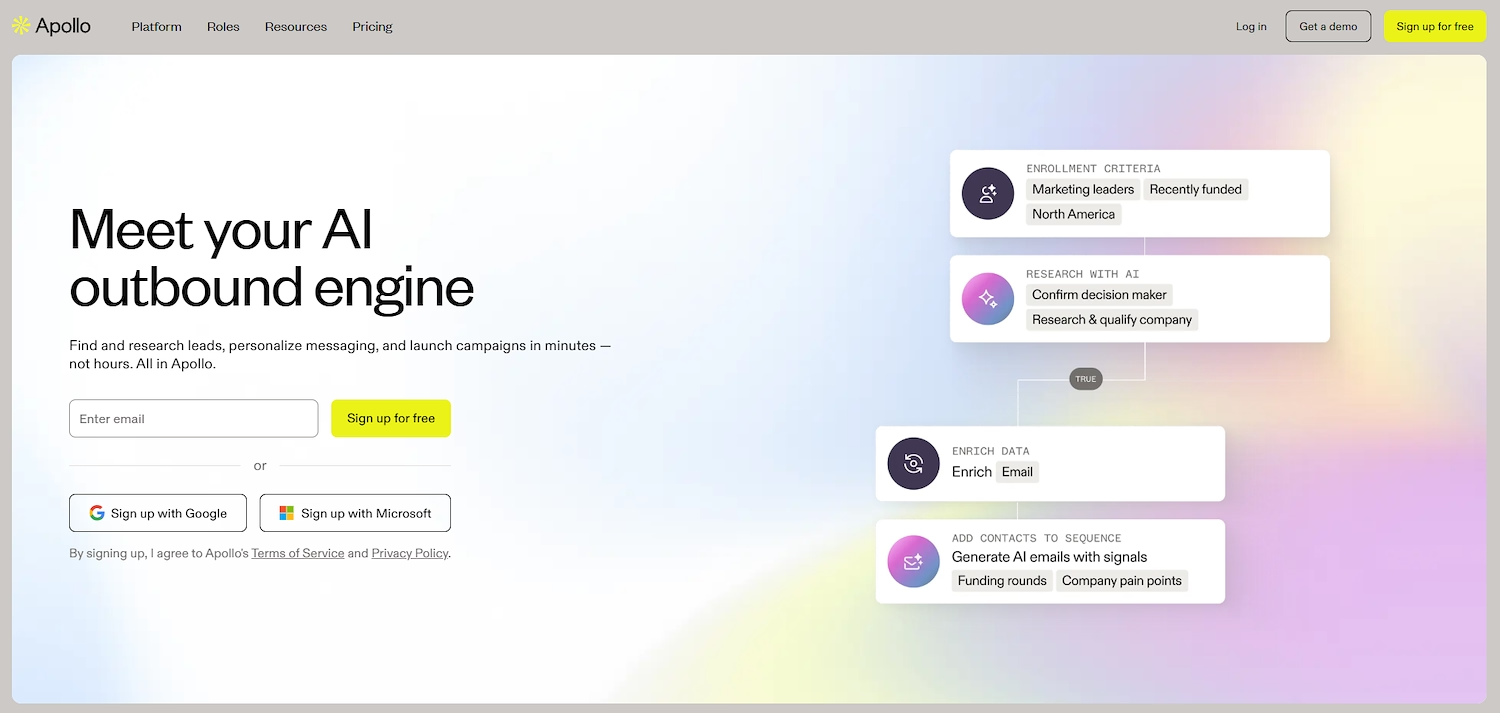
Apollo.io is a sales intelligence platform with a B2B database. Users search for company and contact data to support sales objectives. The platform allows the creation of prospect lists with various filters, which can help identify potential local business customers for outreach efforts.
Apollo.io's Main Features
- Access a B2B database to search for company and contact information.
- Create prospect lists using a variety of data filters to identify potential customers.
Apollo.io's Edge Compared to Scrap.io
Average Review score: 4.7/5 stars based on 8,904 G2 reviews.
- Apollo.io offers a built-in database with over 210 million contacts. This differs from Scrap.io, which creates lists by scraping Google Maps data.
- The platform includes a sales engagement suite to automate outreach. This provides an all-in-one solution, whereas Scrap.io requires separate tools for engagement.
- Unlike Scrap.io, which provides raw scraped data, Apollo.io includes lead enrichment and validation. This function helps create more accurate and complete contact profiles for sales teams.
- Its intelligence engine provides lead scoring and analytics. This is a more advanced feature compared to the simple data extraction offered by Scrap.io.
Apollo.io's Drawbacks Compared to Scrap.io
- Apollo.io uses a pre-built database, so its data for local businesses might not be as current as Scrap.io, which pulls information directly from Google Maps in real-time.
- The platform focuses on a broad B2B market. It might miss some niche or very small local businesses that Scrap.io finds through its dedicated Google Maps scraping function.
- Some users may find the tool lacks specific data points from Google Maps, like recent customer reviews or photos. Scrap.io extracts this type of rich information directly from business listings.
Pricing and Cost-Effectiveness
Apollo.io provides a free plan, with paid tiers starting at $49 per user per month for the Basic plan and $79 for the Professional plan. This subscription model offers predictable costs for accessing its B2B database and sales engagement features.
2) Hunter.io
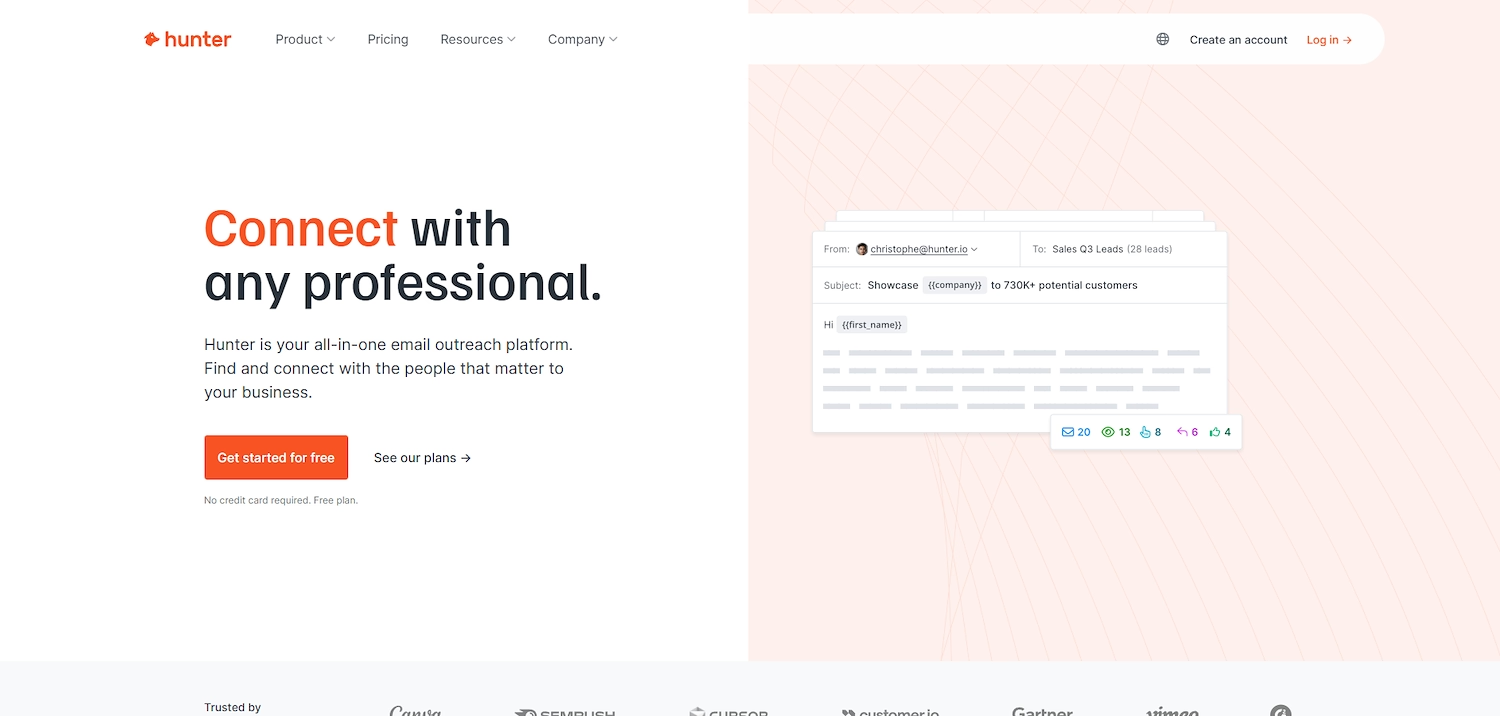
Hunter.io is an email outreach and lead generation platform. It helps businesses find prospects, discover and verify professional email addresses, and run cold email campaigns. The tool offers a searchable B2B database to build lead lists that match a specific customer profile.
Users can also find public contacts at a given company or website. The platform focuses on email communication and data verification to support outreach efforts.
Hunter.io's Main Features
- Find professional email addresses by searching a company domain or by using a person's name and company.
- Verify email addresses in real-time or in bulk to reduce bounce rates and protect sender reputation.
- Compose and schedule personalized email campaigns with automated follow-ups and performance tracking.
- Use a browser extension to discover emails while browsing and integrate with tools like CRMs, Zapier, and Google Sheets.
Hunter.io's Edge Compared to Scrap.io
Average Review score: 4.4/5 stars based on 592 G2 reviews.
- Hunter.io provides an email verification feature to improve deliverability. This differs from Scrap.io, which supplies raw data without a built-in validation process.
- It includes a platform to send cold email campaigns. This creates an all-in-one solution, whereas Scrap.io users need a separate tool for outreach.
- The tool finds professional email addresses by crawling the web. This provides a broader data source than Scrap.io, which is limited to Google Maps data.
- Hunter.io offers integrations with CRMs and tools like Zapier. This allows for more automated workflows compared to Scrap.io, where data handling may be manual.
Hunter.io's Drawbacks Compared to Scrap.io
- Hunter.io creates its database from web data to find emails. This approach sometimes overlooks small local businesses that Scrap.io captures directly from Google Maps listings.
- It primarily provides contact information like email addresses. Users might not find detailed business data, such as recent customer reviews or operating hours, which Scrap.io gets from Google Maps.
- The platform's focus is to find professional emails across industries. This makes it less specialized for the creation of local business databases compared to Scrap.io's dedicated function.
Pricing and Cost-Effectiveness
Hunter.io offers a free plan and paid tiers starting at $49 per month. Since pricing models can vary significantly, we recommend visiting Hunter.io's official website and comparing its plans directly with Scrap.io's current offerings to find the best fit.
3) Snov.io
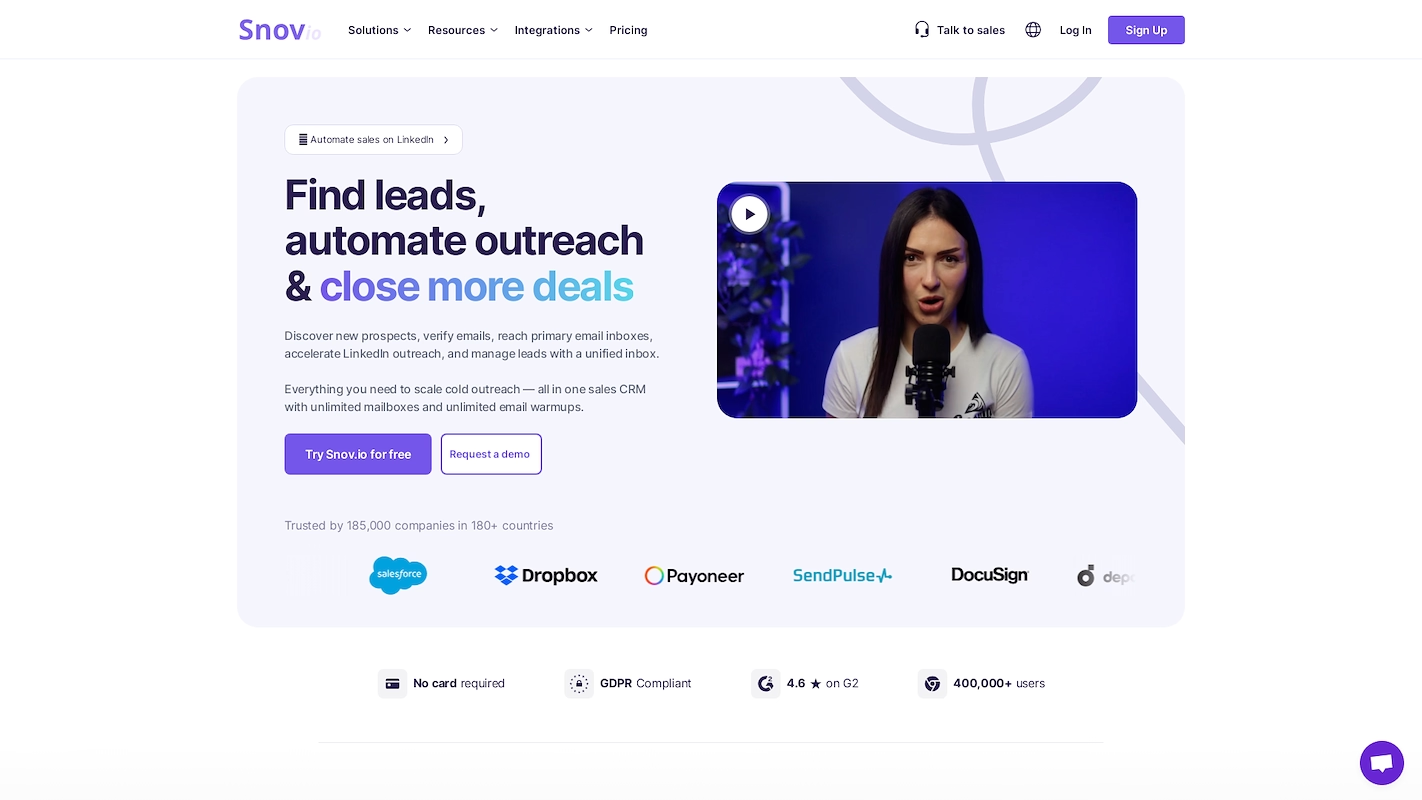
Snov.io is an all-in-one sales platform. It helps businesses find leads, verify contact data, and automate outreach. Users can build accurate prospect lists that match an ideal customer profile and launch multichannel campaigns from one workspace.
The platform also includes a built-in sales CRM for pipeline management. It offers unlimited mailboxes with automated email warm-ups.
Snov.io's Main Features
- Find leads using an email finder and automate outreach with multichannel campaigns across email and LinkedIn.
- Verify contact data with a 7-tier email verifier that provides 98% accuracy and can bypass gray-listing.
- Manage the sales pipeline using a built-in CRM that features Google Calendar sync and automated deal stage tracking.
- Use a deliverability toolkit to automatically warm up email accounts and check domain and inbox placement.
Snov.io's Edge Compared to Scrap.io
Average Review score: 4.6/5 stars based on 450 G2 reviews.
- Snov.io includes a built-in sales CRM to manage the sales pipeline. This differs from Scrap.io, which provides raw data and requires a separate tool for pipeline management.
- The platform automates outreach with multichannel campaigns. Scrap.io focuses on data extraction and does not have a native outreach function.
- It offers a deliverability toolkit with an email warm-up feature to improve sending reputation. This is a function not present in Scrap.io, which only provides contact data.
- Snov.io has a 7-tier email verification system for data accuracy. Scrap.io supplies scraped data without a built-in validation process.
Snov.io's Drawbacks Compared to Scrap.io
- Snov.io uses its own database, which might not have the most current data for local businesses. In contrast, Scrap.io pulls information directly from Google Maps in real-time.
- The tool focuses on contact details like email addresses. Users might miss specific data from Google Maps, such as recent customer reviews or photos, which Scrap.io extracts from business listings.
- It is an all-in-one sales platform, so it is less specialized for creating local business databases. Scrap.io has a dedicated function for scraping Google Maps for this specific purpose.
Pricing and Cost-Effectiveness
Snov.io's paid plans start at $39 per month, offering a subscription-based model. To find the most cost-effective solution, you should compare this pricing directly with Scrap.io's offerings by visiting Snov.io's official website.
4) PhantomBuster
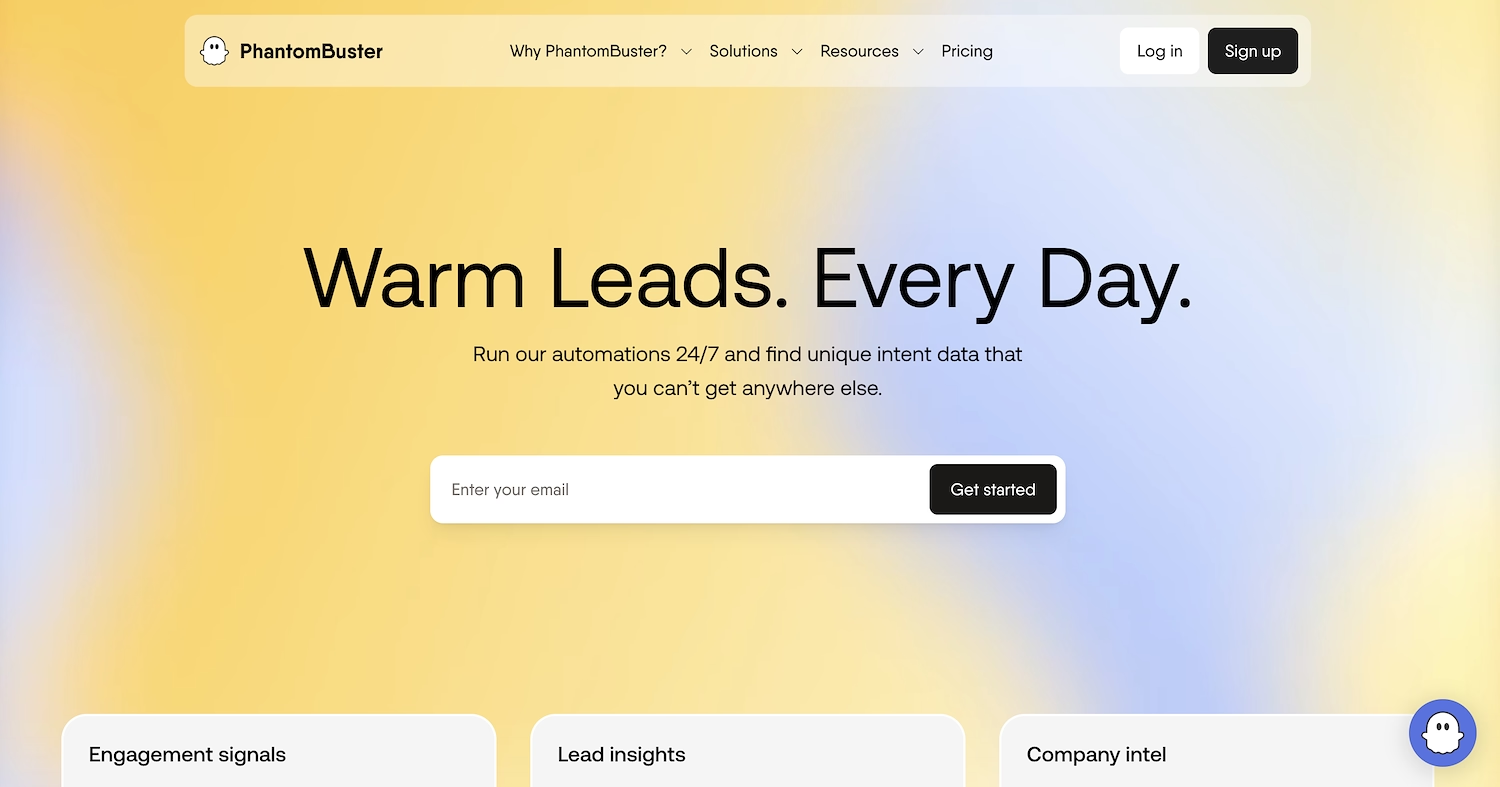
PhantomBuster is a code-free automation tool for data extraction. It uses automations, called 'Phantoms,' to scrape data from websites and social media platforms like Google Maps. This allows businesses to create local business databases with contact details and other public data points.
The platform automates these tasks for lead generation and outreach campaigns.
PhantomBuster's Main Features
- Uses pre-built automations, called Phantoms, to extract data from various online platforms.
- Connects individual automations to create complex workflows for sequential data processing.
- Scrapes data from a wide range of social media platforms and websites beyond just Google Maps.
- Schedules and runs automations in the cloud to collect data automatically at set intervals.
PhantomBuster's Edge Compared to Scrap.io
Average Review score: 4.3/5 stars based on 97 G2 reviews.
- PhantomBuster extracts data from many websites, including LinkedIn and Twitter. This provides more data sources than Scrap.io, which only scrapes Google Maps.
- It connects individual automations to create complex workflows. This differs from Scrap.io, which usually performs a single data extraction task.
- The platform automates online actions, like interacting with prospects. Scrap.io provides data but needs other tools for outreach.
- Its automations can structure data for direct CRM integration. This offers more refined information compared to the raw data from Scrap.io.
PhantomBuster's Drawbacks Compared to Scrap.io
- PhantomBuster's broad automation capabilities can introduce complexity. This contrasts with Scrap.io, which offers a more direct tool dedicated solely to Google Maps data extraction.
- Some users report a learning curve with the platform's workflow builder. In comparison, Scrap.io provides a more immediate, single-purpose interface for its data extraction tasks.
- Its automations sometimes require adjustments when websites change their layout. This might lead to more maintenance than Scrap.io, which concentrates its efforts on the single Google Maps platform.
Pricing and Cost-Effectiveness
While we've covered key features and use cases in this comparison, pricing models can vary significantly between tools. For the most accurate and up-to-date pricing information, we recommend visiting PhantomBuster's official website.
5) RocketReach
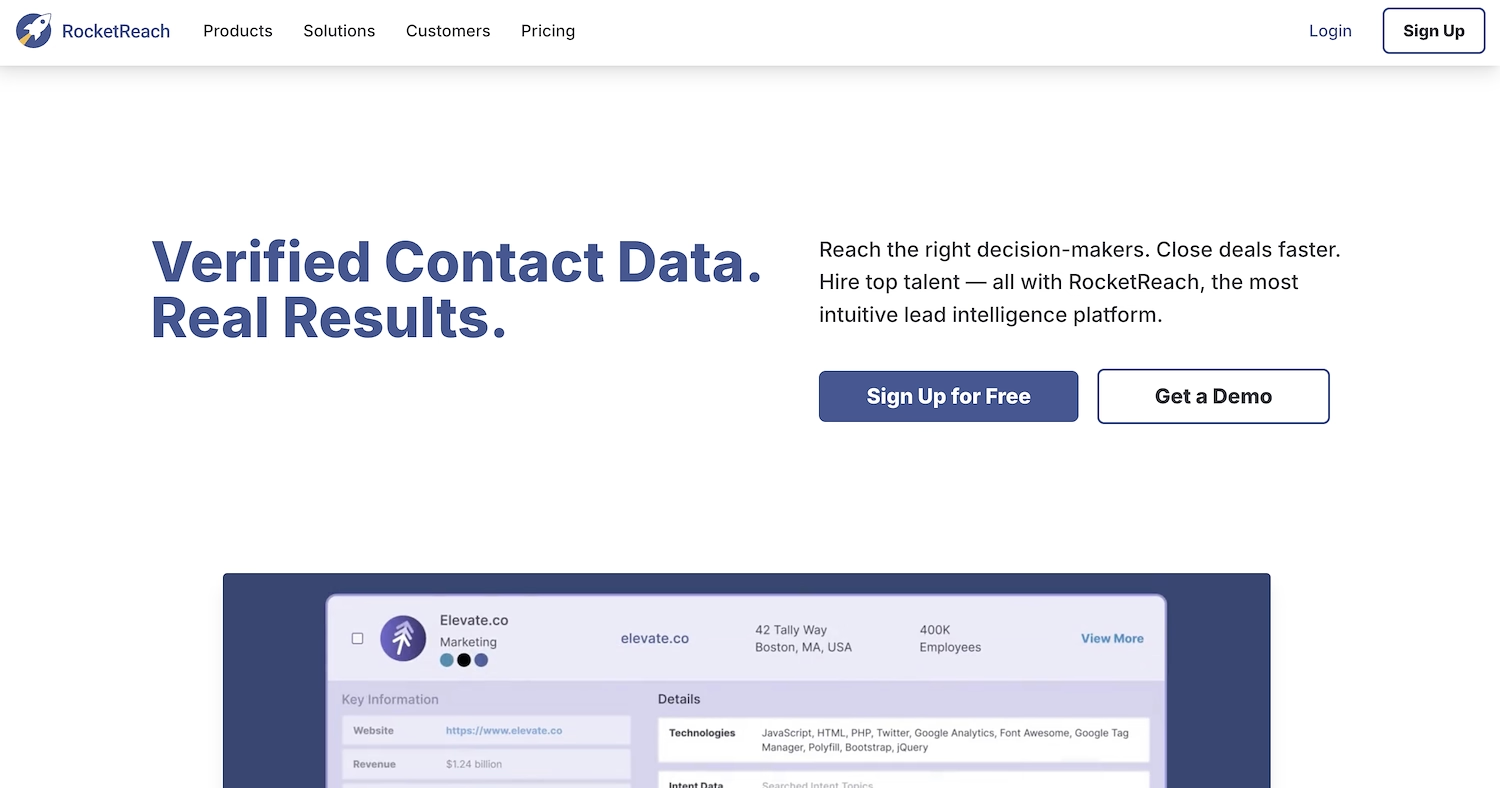
RocketReach is a platform with a large database of professional and company contacts. Businesses use it to find information for lead generation and sales outreach. Its search functions can help build prospect lists that include local businesses for targeted campaigns.
RocketReach's Main Features
- Access a large database of professional and company contacts.
- Use search functions to find information for lead generation and sales outreach.
- Build prospect lists that include local businesses for targeted campaigns.
RocketReach's Edge Compared to Scrap.io
Average Review score: 4.4/5 stars based on 918 G2 reviews.
- RocketReach provides access to a database of over 700 million professionals. This offers a wider data pool compared to Scrap.io, which focuses only on data from Google Maps.
- It offers verified contact details, including emails and phone numbers. This is different from Scrap.io, which extracts public data from Google Maps without a separate verification step.
- The platform integrates directly with CRMs like Salesforce and HubSpot. This allows for a more automated workflow than Scrap.io, where data transfer is often a manual process.
- Users get access to an API and bulk lookup features for large-scale data tasks. This provides more technical flexibility than the direct scraping function of Scrap.io.
RocketReach's Drawbacks Compared to Scrap.io
- RocketReach's database may sometimes contain outdated information for local businesses. In contrast, Scrap.io provides real-time data by scraping Google Maps directly, which can offer more current details.
- It focuses on professional contacts across many industries. This means it might miss specific Google Maps data points, like recent customer reviews or photos, that Scrap.io extracts directly from business listings.
- The tool is less specialized for creating local business databases from Google Maps. Scrap.io, on the other hand, has a dedicated function specifically for this purpose, which some users might find more direct.
Pricing and Cost-Effectiveness
RocketReach offers a free plan, with paid options starting at $99 per month for 100 lookups. This subscription model is based on the number of contacts you look up. To determine the most cost-effective option, you should compare these plans directly with Scrap.io's pricing, which is based on data extraction tasks.
Recruit Digital Workers With 11x
If your goal is to automate sales tasks with autonomous agents, 11x offers a different approach. The platform provides digital workers to handle functions like lead identification and outreach. Evaluate its capabilities to see if it fits your operational needs and workflow.
With 11x, our AI agents run your sales playbook. Alice finds accounts and handles outreach, while Julian qualifies leads and schedules meetings. Data enrichment, email warmup, and more are handled on one platform. This replaces multiple GTM tools and the need for new hires.
Book a Demo to see how our agents work.
6) Lusha
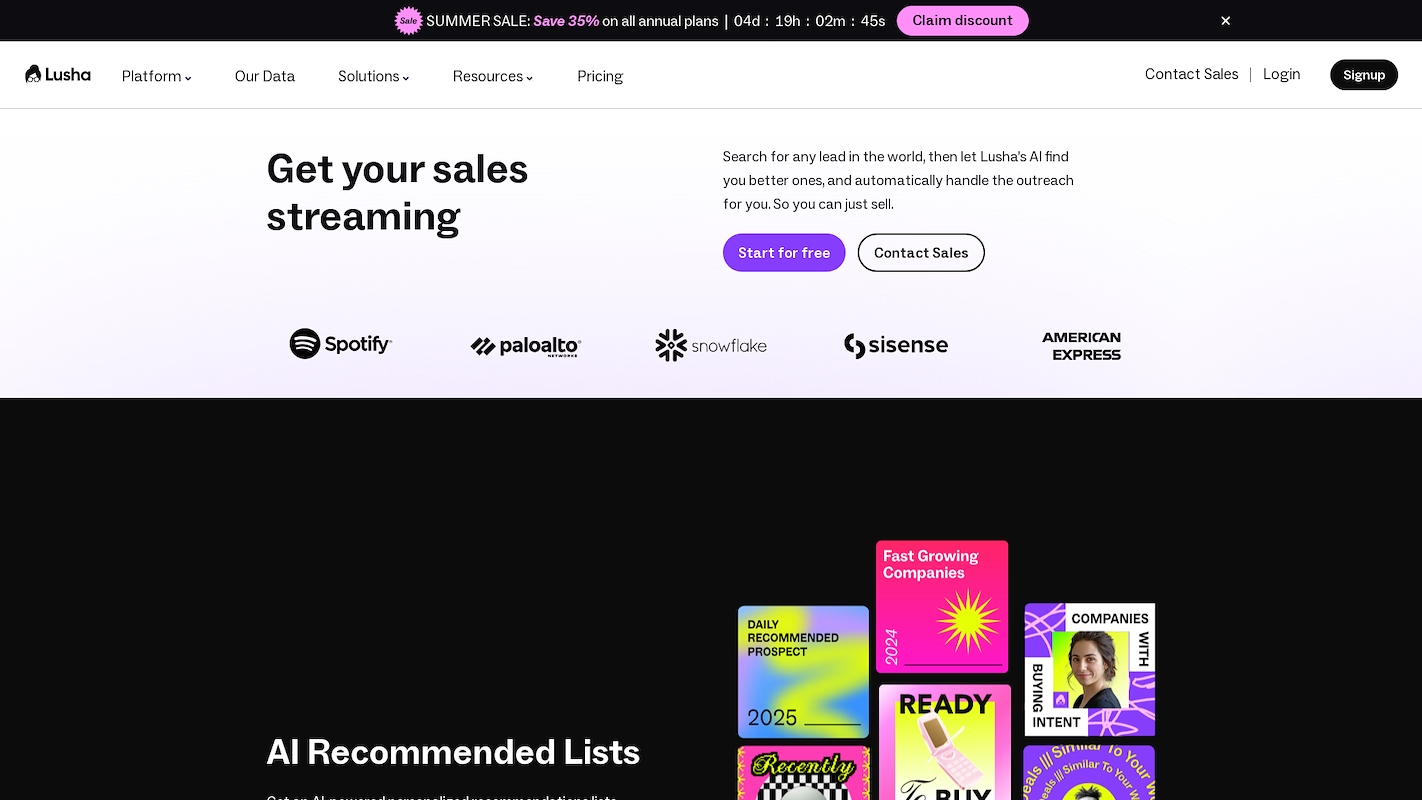
Lusha is a sales intelligence platform with a database of B2B contact and company information. Teams use the tool to obtain data for sales and marketing initiatives. It allows users to search for prospects, including local businesses, to support outreach campaigns and build contact lists for specific markets.
Lusha's Main Features
- Searches for contacts and companies using AI-powered filters such as buyer intent and funding rounds.
- Automates and personalizes email sequences driven by AI copy.
- Records and analyzes sales meetings to provide insights.
- Captures contact data directly from LinkedIn and the web with a browser extension.
Lusha's Edge Compared to Scrap.io
Average Review score: 4.3/5 stars based on 1,516 G2 reviews.
- Lusha offers AI Prospect Playlists to automatically update lead lists. This is a different approach from Scrap.io, which provides a static list from one data extraction.
- It provides access to a large B2B contact database. This gives users a wider pool of data than Scrap.io, which focuses only on information from Google Maps.
- The platform includes data enrichment to create more complete contact profiles. This is a feature not found in Scrap.io, which supplies raw, unverified data.
- Direct integrations with CRMs and marketing automation tools create a more automated workflow. This differs from Scrap.io, where data transfer is often a manual process.
Lusha's Drawbacks Compared to Scrap.io
- Lusha's data for local businesses can sometimes be less current. This is because it uses a pre-built database, while Scrap.io scrapes Google Maps in real-time for the latest information.
- It might miss some niche or very small local businesses. Scrap.io, with its dedicated Google Maps scraping function, is often more effective at capturing these specific listings.
- The platform focuses on contact details like emails. Users might not find rich data from Google Maps, such as recent customer reviews or operating hours, which Scrap.io extracts directly.
Pricing and Cost-Effectiveness
Lusha offers a free plan, and its paid tiers start at $36 per user per month. This subscription model contrasts with Scrap.io, which typically prices based on data extraction tasks. To determine the most cost-effective option, you should compare these plans on Lusha's official website with Scrap.io's current offerings.
7) Clearbit
Clearbit is a data enrichment platform for B2B companies. It provides company and contact information to help businesses understand their customers and market. The platform integrates with existing systems to append data to customer records.
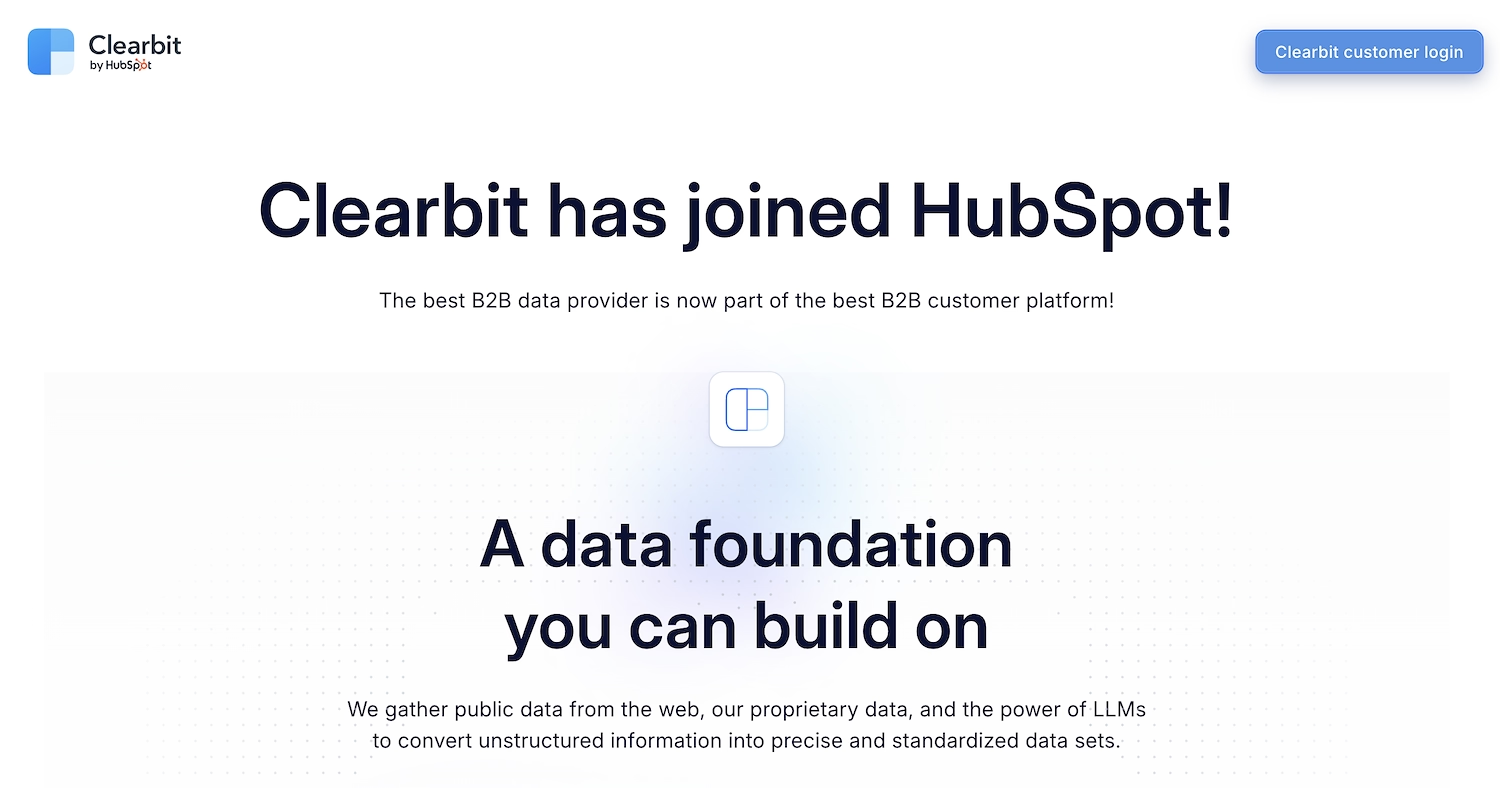
Clearbit works with a company's current systems to enrich its data. It appends company and contact information to customer records. This process helps teams understand their market. For those who target local businesses, this enriched data can help build more detailed prospect lists.
Clearbit's Main Features
- Adds firmographic and demographic details to lead, contact, or account records.
- Provides data points to score and route leads instantly using industry classifications and corporate hierarchy mapping.
- De-anonymizes website traffic to identify visiting companies that match an ideal customer profile.
- Removes form fields that the platform can enrich automatically to reduce friction and increase conversion.
Clearbit's Edge Compared to Scrap.io
Average Review score: 4.4/5 stars based on 626 G2 reviews.
- Clearbit enriches existing records with over 100 data points. This is different from Scrap.io, which provides raw data without this level of detail.
- It integrates directly with CRMs like HubSpot for automated workflows. This offers a more connected system than Scrap.io, where data transfer is often a manual process.
- The platform identifies anonymous companies that visit your website. This function provides a source for new leads not found in Scrap.io's Google Maps scraping.
- Its API access gives teams more technical flexibility for data tasks. This is a more advanced option compared to the direct scraping function of Scrap.io.
Clearbit's Drawbacks Compared to Scrap.io
- Clearbit relies on its own database, which may sometimes have less current information for local businesses compared to Scrap.io's real-time Google Maps data extraction.
- The tool focuses on B2B data points like company size and technology. It might not capture specific details from Google Maps, such as recent customer reviews or photos, which Scrap.io extracts directly.
- Some users might find Clearbit less direct for building local business lists from scratch. Its primary function is to enrich existing contact data, while Scrap.io is specifically designed for scraping Google Maps.
Pricing and Cost-Effectiveness
While we've covered key features and use cases in this comparison, pricing models can vary significantly between tools. For the most accurate and up-to-date pricing information, we recommend visiting Clearbit's official website.
8) GetProspect
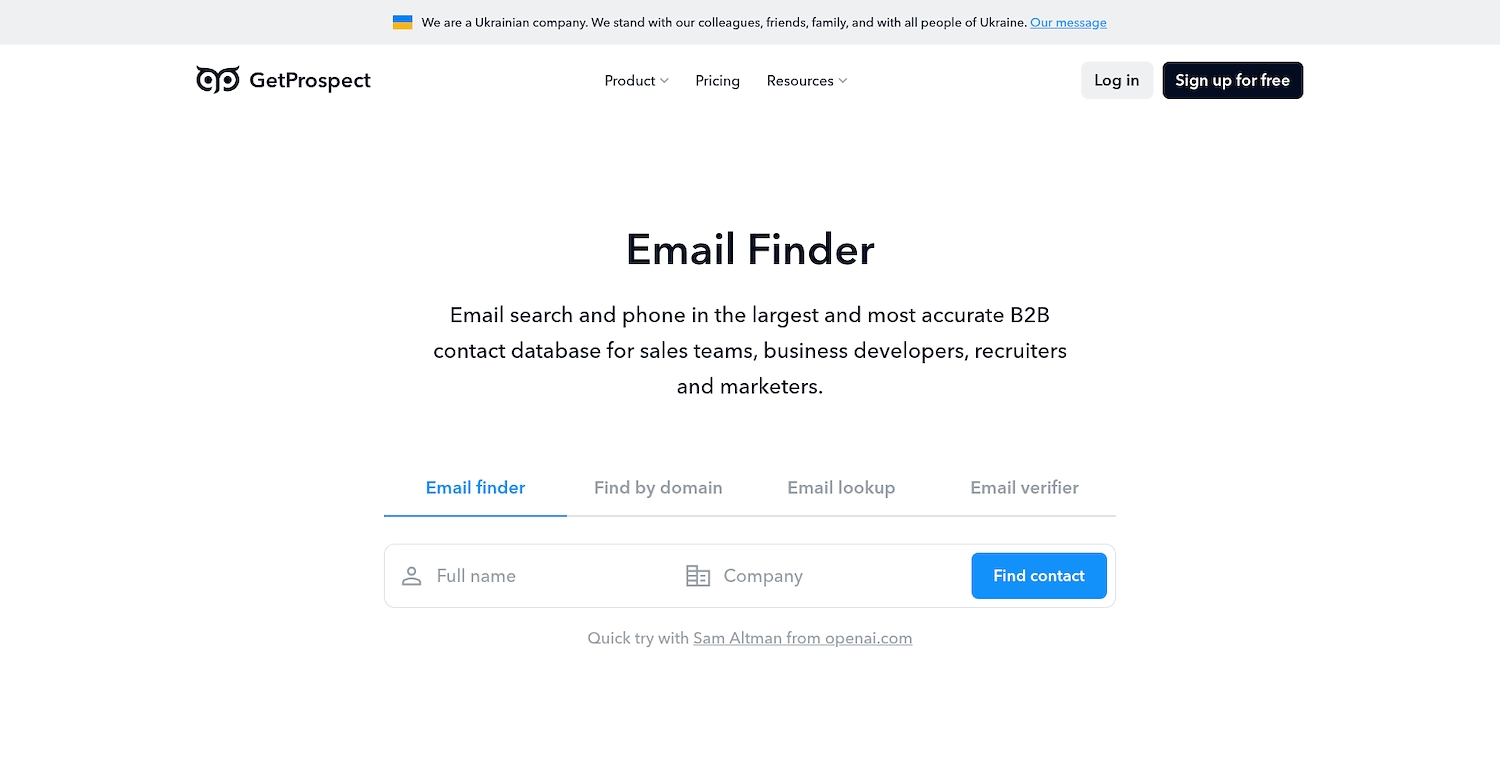
GetProspect is a B2B contact database used for lead generation. The platform allows businesses to build prospect lists with search filters. For local business outreach, users can find company and professional data in specific geographic areas to support sales and marketing campaigns.
GetProspect's Main Features
- Finds professional email addresses from LinkedIn or a B2B database using filters like job title, location, and industry.
- Uses machine learning to predict email addresses based on publicly available data.
- Includes a real-time email verifier that re-checks data monthly to reduce bounce rates.
- Exports lead lists with names, corporate emails, positions, LinkedIn URLs, and company information.
GetProspect's Edge Compared to Scrap.io
Average Review score: 3.9/5 stars based on 39 G2 reviews.
- GetProspect finds contacts from its B2B database and LinkedIn. This provides a different data source compared to Scrap.io, which only extracts data from Google Maps.
- It includes a real-time email verifier that re-checks data monthly. This helps improve data accuracy, while Scrap.io provides raw data without a built-in validation process.
- The tool uses machine learning to predict professional email addresses. This is a more advanced method to find contacts compared to the direct data extraction offered by Scrap.io.
- Users can search for leads with specific filters like job title and industry. This offers a more targeted search for prospects than Scrap.io, which is limited to Google Maps search parameters.
GetProspect's Drawbacks Compared to Scrap.io
- GetProspect's data comes from its own database and LinkedIn. This sometimes means it misses small local businesses that Scrap.io captures directly from Google Maps.
- The tool provides professional contact details. Users might not find rich data like recent customer reviews or photos, which Scrap.io extracts from Google Maps listings.
- It serves a broad B2B market. This makes the platform less specialized for building local business databases compared to Scrap.io's dedicated function for that task.
Pricing and Cost-Effectiveness
GetProspect offers a free plan and paid tiers starting at $49 per month for 1,000 valid emails. This subscription model provides predictable costs for ongoing lead generation. In contrast, Scrap.io's task-based pricing may be more cost-effective for one-off data extraction projects. Compare plans on the GetProspect website to see which model fits your needs.
9) Uplead
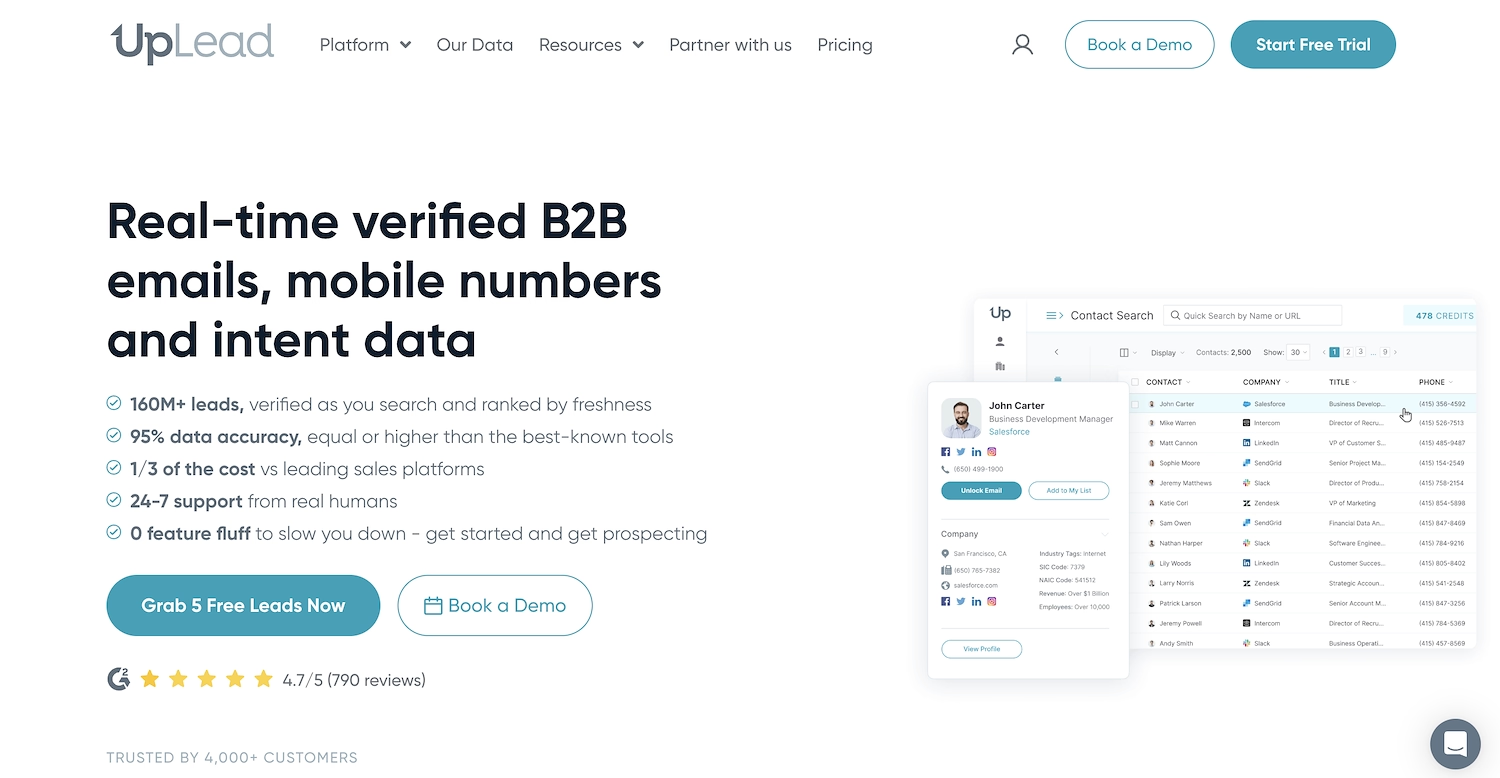
Uplead is a B2B data platform that offers verified contact and company profiles. Businesses use the tool to find prospects and create targeted lists. With its search capabilities, users can pinpoint local businesses to support sales initiatives and build a customer base in specific geographic areas.
Uplead's Main Features
- Finds in-market buyers using over 50 search filters, including intent data.
- Verifies emails and mobile numbers in real-time to ensure data accuracy.
- Integrates with CRMs like Salesforce and HubSpot, as well as Zapier, to automate workflows.
- Cleans and enriches existing contact data to build more complete profiles.
Uplead's Edge Compared to Scrap.io
Average Review score: 4.7/5 stars based on 797 G2 reviews.
- Uplead provides real-time email verification, which guarantees 95% data accuracy. This differs from Scrap.io, which supplies raw data without a built-in validation process.
- The tool includes intent data to find buyers who actively seek solutions. This is a more advanced feature compared to Scrap.io, which is limited to Google Maps search queries.
- Direct integrations with CRMs like Salesforce and HubSpot allow for a more automated workflow. This is a point of difference from Scrap.io, where data transfer is typically a manual task.
- Its data enrichment feature adds details to existing contact lists. Scrap.io, in comparison, extracts new data from a single source but does not append information to current records.
Uplead's Drawbacks Compared to Scrap.io
- Uplead's data for local businesses can sometimes be less current because it uses a pre-built database. In contrast, Scrap.io scrapes Google Maps in real-time for the latest information.
- It might miss some niche or very small local businesses. Scrap.io, with its dedicated Google Maps scraping function, is often more effective at capturing these specific listings.
- The platform focuses on contact details like emails and phone numbers. Users might not find rich data from Google Maps, such as recent customer reviews or operating hours, which Scrap.io extracts directly.
Pricing and Cost-Effectiveness
Uplead offers paid plans starting at $99 per month, providing a predictable subscription cost. This contrasts with Scrap.io's task-based pricing, which could be more cost-effective for one-off data extraction projects rather than continuous use.
10) AeroLeads
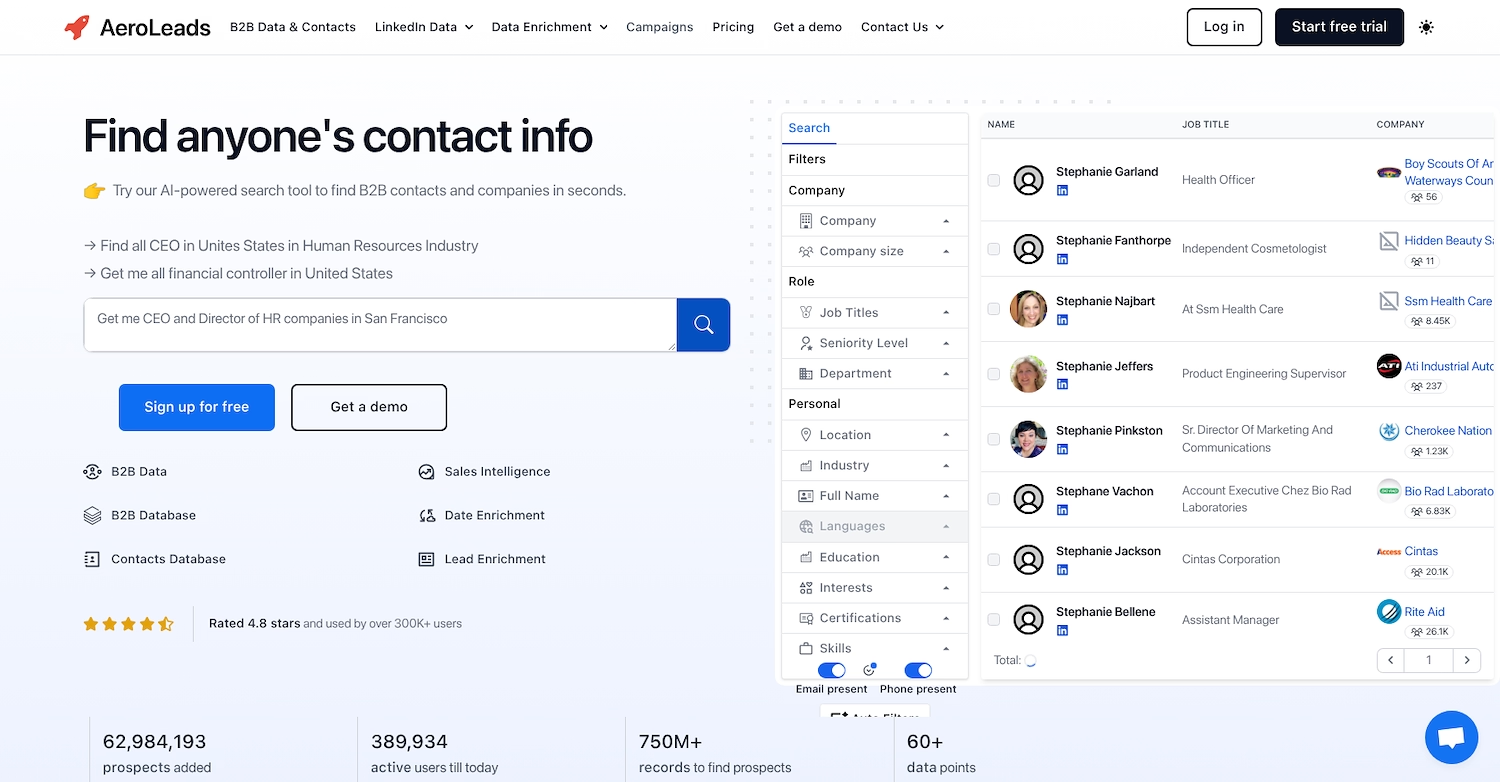
AeroLeads is a lead generation tool. It helps businesses find contact information, such as email addresses and phone numbers, from professional networks. The platform allows users to build prospect lists with data from specific locations. This supports the creation of local business databases for targeted outreach campaigns.
AeroLeads's Main Features
- Finds prospects and their contact details from sites like LinkedIn, Crunchbase, and AngelList.
- Accepts user-uploaded lists to find prospects and contact information.
- Transfers data to other platforms, including Salesforce, Zapier, and Mailchimp.
AeroLeads's Edge Compared to Scrap.io
Average Review score: 4.0/5 stars based on 65 G2 reviews.
- AeroLeads finds prospects from professional networks like LinkedIn and Crunchbase. This offers different data sources compared to Scrap.io, which focuses only on Google Maps.
- The platform transfers data directly to CRMs like Salesforce and marketing tools. This provides a more connected workflow than Scrap.io, where data handling is often manual.
- It allows users to upload their own lists of names or companies to find contact information. This is a different function from Scrap.io, which generates new lists by scraping.
- The tool specializes in finding professional contact details from various websites. This is unlike Scrap.io, which extracts a broader set of business data only from Google Maps.
AeroLeads's Drawbacks Compared to Scrap.io
- AeroLeads pulls data from professional networks, which can miss small local businesses. Scrap.io, in contrast, scrapes Google Maps directly, often resulting in more comprehensive local business lists.
- Some users report that the tool can return irrelevant prospect data even with filters. Scrap.io, by targeting specific Google Maps search queries, may provide more contextually relevant results for local business searches.
- The platform's focus on professional networks may not be ideal for users who need data on niche or service-area businesses. Scrap.io's method of scraping Google Maps can capture a wider range of these local entities.
Pricing and Cost-Effectiveness
AeroLeads offers paid plans starting at $49 per month. This subscription model is suited for ongoing lead generation, while Scrap.io's task-based pricing may be more cost-effective for one-off data extraction projects.
Which One Should You Go With?
The choice of a Scrap.io alternative depends on many variables. This guide shared several options to help you decide which tool best fits your requirements.
If sales automation is your objective, evaluate 11x. The platform uses autonomous agents for lead generation and outreach, which can replace multiple tools and the need for new hires.




